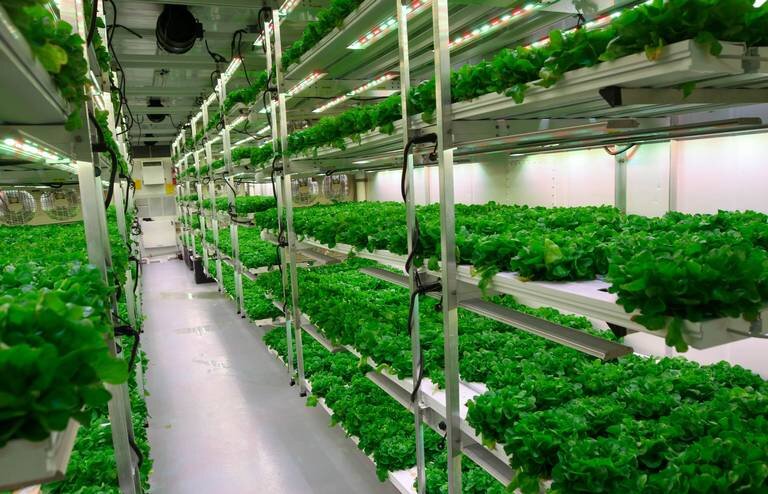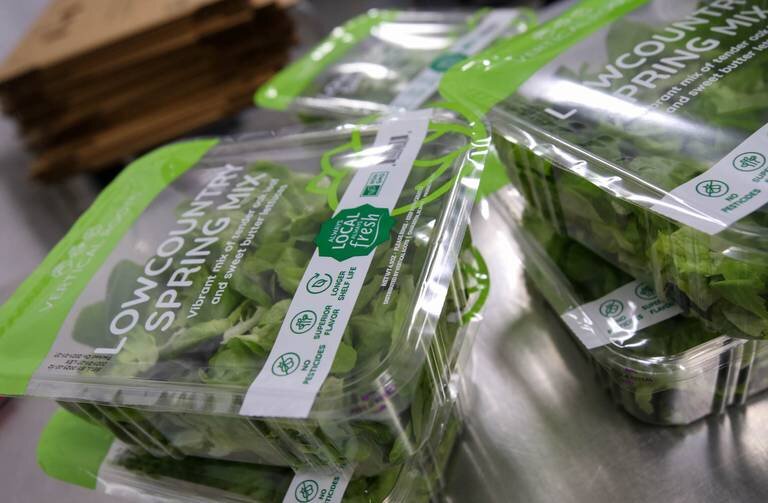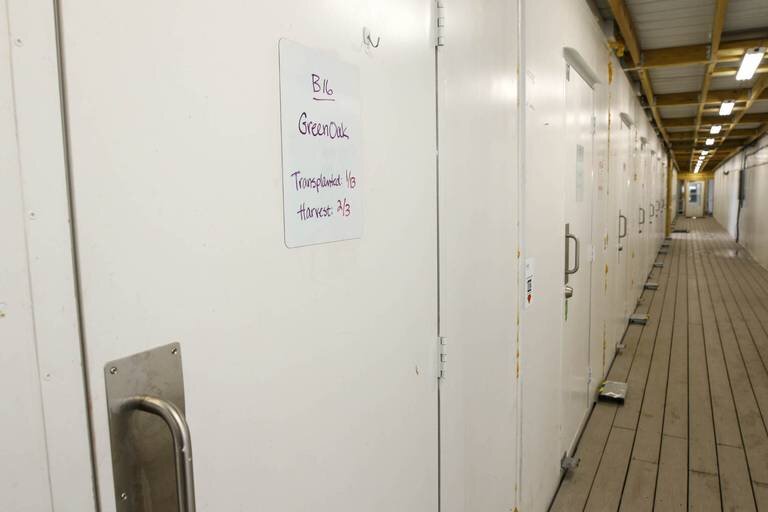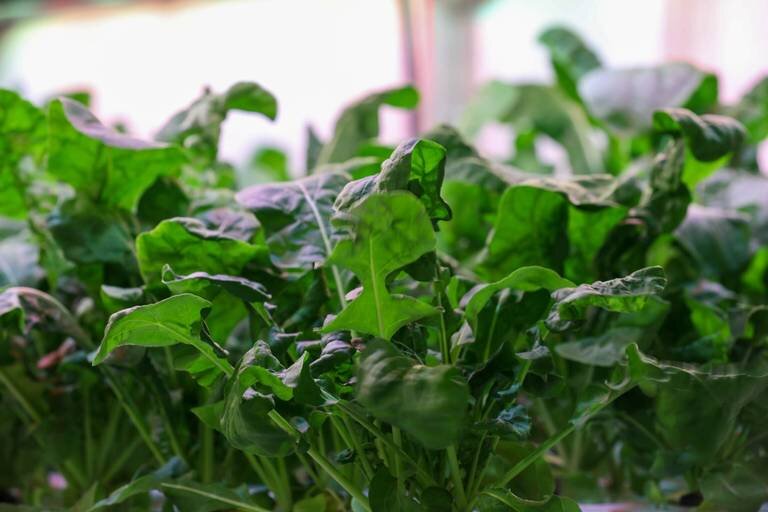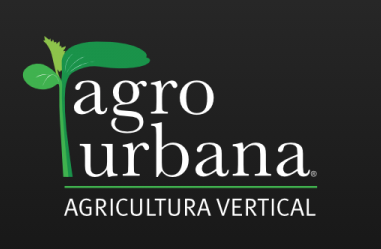
Welcome to iGrow News, Your Source for the World of Indoor Vertical Farming
HPNow And Kaneya Sign HPGen™ Distribution Agreement For Japanese High-Tech Horticulture Market
Agreement will provide Japan’s cutting-edge horticulture growers with access to HPGen™ benefits in autonomous, safe, and sustainable irrigation water treatment
COPENHAGEN, DENMARK, and MINAMICHITA, JAPAN (July 15, 2021) – HPNow, a global provider of HPGen™ Peroxide UltraPure™ on-site generation solutions, and Kaneya, Japan’s leading distributor of advanced horticulture inputs and solutions, are pleased to announce the signing of an HPGen™ distribution agreement for the Japanese market.
The Kaneya team with the HPGen™ system
Kaneya is a leader in the horticulture industry in Japan. The company has a large international network, and its mission as a distributor of high-end greenhouses and related equipment and inputs is to contribute to the future of advanced horticulture. The HPGen™ systems will play key role in supporting the company’s vision. Kaneya is active in 10 countries, and also operates its own high-tech greenhouse.
The distribution agreement will give Japan access to HPNow’s patented technology solution for autonomous, safe, and sustainable on-site generation of ultrapure hydrogen peroxide. HPGen has already proven strong effectiveness in agriculture operations around the world, providing for improved crop protection and reduced irrigation system maintenance across a wide range of crops, cultivation methods, and climates. Many HPGen customers further report increased crop yields.
“We’re very pleased to be working together with such an esteemed company as Kaneya,” comments Ziv Gottesfeld, CEO of HPNow. “Japan is at the forefront of controlled-environment agriculture, and this agreement is illustrative of the confidence the industry has in our products to support its cutting-edge cultivation methods.”
“We are looking forward to a strong collaboration with HPNow in the Japanese market,” adds Kazuta Aoyama, International Sales and Business Development Manager with Kaneya. “The HPGen technology offers exciting benefits to Japanese growers, which they will be eager to integrate into their operations.”
About Kaneya
Celebrating its golden anniversary, Kaneya is a leading horticultural and agricultural solution provider, selling and distributing products that range from its core, technologically advanced offering of plastic pots and trays, to a variety of other related products produced by leading horticulture companies around the world, including substrate, seeds, and plants, greenhouse equipment, fertilizer, etc. With more than 12,000 customers on record, and some 5,000 active, satisfied, and fiercely loyal active customers, Kaneya operates throughout Japan and exports its products to 10 countries, and has established itself as a global force in the horticulture industry.
About HPNow
HPNow addresses growing global challenges in clean water and sanitation through its range of on-site, autonomous, safe and sustainable hydrogen peroxide generation solutions. Headquartered in Copenhagen, and with representation across Europe, the Americas, and Asia, they address their clients’ water treatment needs in market segments ranging from agriculture and aquaculture, to industrial and drinking water treatment. HPNow is a technology and market leader in on-site generation of hydrogen peroxide and is continuously striving to further advance its technology and products in order to meet growing market needs and rising global demand.
Stay in the loop by following HPNow on LinkedIn and Facebook.
VIDEO: Japanese University Looks Abroad
Researchers hope to promote technologies for things like breeding vegetables that grow well indoors
June 3, 2021
A Japanese university is turning overseas to find new customers for farming and medical technologies developed by its staff.
Chiba University has teamed up with the Japan External Trade Organization, or JETRO. They signed an agreement last month.
The push abroad will mainly be online for now as the coronavirus pandemic pulls the plug on conferences and other trade events.
Researchers hope to promote technologies for things like breeding vegetables that grow well indoors.
They are already making progress in China.
The university's technology is helping a next-generation plant-growing facility in the city of Shenzhen.
Watch the video at www.nhkj.or.jp.
US - SOUTH CAROLINA: VIDEO: Columbia Vertical Farm Uses Technology To Cut Plastic Pollution And Boost Sustainability
With the use of agricultural technology, Vertical Roots farm in West Columbia created a packaging system for its leafy greens that cut down the company’s plastic usage by 30% and extends the shelf life of the lettuce
FEBRUARY 01, 2021
Vertical Roots is the largest hydroponic container farm in the country. They grow and package lettuce varieties and have recently implemented a packaging process that reduces plastic with a resealable film. TRACY GLANTZ TGLANTZ@THESTATE.COM
With the use of agricultural technology, Vertical Roots farm in West Columbia created a packaging system for its leafy greens that cut down the company’s plastic usage by 30% and extends the shelf life of the lettuce.
In 2015, high school friends Andrew Hare and Matt Daniels created the idea for Vertical Roots, now the largest hydroponic container farm in the country. Hare is the general manager of the company and Daniels acts as the chief horticulturist.
The first Vertical Roots opened in Charleston and expanded with its second farm site in West Columbia in 2019. Vertical Roots parent company, AmplifiedAg, manufactures the container farms and farm technology of which Vertical Roots operates.
The farms are part of a growing industry called controlled environmental agriculture (CEA) that uses technology to ramp up nutrient-rich food production year-round.
Hydroponics helps the farm uses 98% less water than traditional farming, according to Hare. Their technology creates an indoor environment to grow lettuce on the East Coast. Most lettuce in the U.S. comes from California and Arizona, where temperatures do not fluctuate much throughout the year, traveling 2,000 miles from farm to table. Vertical Roots offers a solution for local lettuce.
“Our mission is to revolutionize the way communities grow, distribute and consume food,” said Hare. As populations grow, Hare said the ability to produce enough food is a global concern.
VERTICAL ROOTS AGRICULTURAL INNOVATION
As a company committed to sustainability, Vertical Roots had to address its plastic usage and the consumer demand for environmentally friendly products.
“I think everyone can agree that the amount of plastic that’s consumed and used globally is a bit of a problem,” said Hare.
If Vertical Roots were to completely opt-out of using plastics, as much as 40% of the lettuce would be damaged in transportation to the retailers, Hare said. So the company decided to still use plastic containers in order to cut out food waste, but it changed the amount and type of plastic used.
By replacing the conventional “clamshell” plastic lids that you see on a container of lettuce at the grocery store, Vertical Roots cut down more than 30% of plastic usage by creating a resealable film lid. The new packaging comes at no extra cost to the customer and will be cheaper in the long-run for Vertical Roots, according to Hare.
The farm also uses recycled plastic that can also be recycled again after use. Tiny perforations in the film lid of the packaging allows air to leave the lettuce container and extends the product’s freshness, making Vertical Roots lettuce last around 14 days on the shelf.
“We tested respiration and condensation with each lettuce variety, and ultimately found that we could extend the freshness and shelf life of our salad mixes even more,” said Hare.
GROWTH IN THE AGRICULTURAL TECHNOLOGY INDUSTRY
In the first three quarters of 2020, a record $754 million of venture capital was invested in the vertical farming industry, according to PitchBook data. This was a 34% increase from the entire previous year, Bloomberg reported in a January article.
A 2019 report from Global Market Insights showed that the vertical farming market size, or the number of potential customers or unit sales, surpassed $3 billion in 2018 and said it, “will exhibit a massive compound annual growth rate (CAGR) of over 27% from 2019 to 2026.”
In vertical farms, crops are harvested on several vertical layers indoors, where farmers can grow year-round by controlling light, temperature, water, and other factors, according to the U.S. Department of Agriculture.
Vertical agriculture is also seen as a growing industry because it “could help increase food production and expand agricultural operations as the world’s population is projected to exceed 9 billion by 2050,” according to the USDA.
However, some are skeptical about the future of vertical farming for several reasons. The farms use LED light bulbs to grow the crops, which require a lot of energy and money to operate.
Also, the farms mostly produce greens, which are low in calories because they take less water and light. The new farming technology is marketed as a way to combat world hunger, but in poorer countries, low-calorie greens are not as beneficial, according to Bloomberg.
THE FUTURE OF VERTICAL ROOTS
Despite a tough year due to COVID-19, Vertical Roots will open two more indoor, container farms in Georgia and Florida in 2021.
The company lost revenue from foodservice customers like restaurants, schools, and universities during the pandemic, said Hare.
Those food service customers accounted for about half of Vertical Roots’ business, Hare said. Grocery store business stayed steady and even grew during the pandemic. As schools and restaurants are slowly reopening, Vertical Roots is gaining business back.
The West Columbia farm location produces about $1.5 million pounds of produce per year, said Hare. Vertical Roots lettuce is in 1,200 different grocery stores in 11 states, including Lowes Foods stores, Publix, Harris Teeter, and Whole Foods Market chains.
Hare said the company is constantly working on sustainable initiatives, including figuring out a way to reduce light energy consumption by 20-25%, thinking about compostable packaging systems and finding ways to use less water at the farms.
In the future, Vertical Roots hopes to offer a larger variety of produce. The team is experimenting with growing foods like tomatoes, cucumbers, peppers, herbs and mushrooms to see if they could be viable products.
Vera Vertical Farming Technology Introduced in Finland’s Largest Retail Group
Finland’s largest retailer is now carrying produce farmed in vertical-farming centers to provide ultra-fresh produce year round.
Netled And Pirkanmaan Osuuskauppa Sign A New Long-Term Cooperation Agreement
In the photo: Ville Jylhä, COO of Pirkanmaan Osuuskauppa
Netled has entered into a significant long-term cooperation agreement with Pirkanmaan Osuuskauppa, a regional operator of S-Group, the largest retail chain in Finland.
Netled’s Vera Instore Premium Growing Cabinets, offering a range of herbs and salads, will now be a regular feature in Prisma retail stores in the Pirkanmaa area. Herbs and some of the leafy greens are grown in-store in the cabinets, and are harvested directly off the shelf. The growing conditions are fully automated and controlled remotely.
The newly opened Prisma Pirkkala is Finland’s first hypermarket to launch the new Vera Instore Cabinets. In addition, Netled will deliver to the hypermarket salads and herbs grown on its own vertical farm nearby, thereby allowing customers to get same-day harvested herbs and salads all year round.
”With this newly formed collaboration we can offer consumers fresh, ultra-locally produced products and at the same time introduce them to vertical farming as a method of ecological, urban farming”, says Ville Jylhä, COO of Pirkanmaan Osuuskauppa.
S-Group is a customer-owned Finnish network of companies in the retail and service sectors, with more than 1 800 outlets in Finland. The group offers services in areas such as, supermarket trade, department store, and speciality store trade. As the largest retail group in Finland, S-Group’s main focus is also on sustainable food and innovative ways it can offer healthy and responsibly produced food to its customers.
Netled Ltd. is Finland’s leading provider of turn-key vertical farming systems and innovative greenhouse lighting solutions.
”As the leading vertical farming technology provider in Finland, we have developed an extensive range of products for all segments of vertical farming. Instore growing systems are a rapid-growth segment, and our cutting-edge Vera technology puts us at the forefront of the instore space”, says Niko Kivioja, CEO of Netled Ltd.
“The agreement with Pirkanmaan Osuuskauppa is just the latest proof of concept, and is also a clear signal to potential customers, investors and other global partners that Vera technology is a game changer.”
18th December 2020 by johannak
More information:
Niko Kivioja
CEO, Netled Ltd
+358 50 360 8121
Robert Brooks, Investor Relations and Communications Manager
+358 50 484 0003
41 Million Dollar Investment To Boost Abu Dhabi's Agriculture Technology
The Abu Dhabi Investment Office, ADIO, announced today individual partnerships with Pure Harvest Smart Farms, Pure Harvest, FreshToHome, and Nanoracks that will see the companies receive financial and non-financial incentives totaling AED 152 million (USD 41 million)
Three innovative agriculture companies will develop cutting-edge projects in Abu Dhabi to boost the emirate’s agriculture technology, AgTech, capabilities across land, sea, and space.
The Abu Dhabi Investment Office, ADIO, announced today individual partnerships with Pure Harvest Smart Farms, Pure Harvest, FreshToHome, and Nanoracks that will see the companies receive financial and non-financial incentives totaling AED 152 million (USD 41 million). The research and technologies developed by these companies will expand existing capabilities in Abu Dhabi’s AgTech ecosystem and promote innovation in the sector to address global food security challenges.
New partnerships
The new partnerships are a continuation of ADIO’s efforts to accelerate the growth of Abu Dhabi’s AgTech ecosystem through the AgTech Incentive Programme, which was established under Ghadan 21, Abu Dhabi’s accelerator program. The Programme is open to both local and international AgTech companies. The partnerships follow ADIO’s AED 367 million (USD 100 million) investment earlier this year to bring four AgTech pioneers – AeroFarms, Madar Farms, RNZ, and Responsive Drip Irrigation, RDI, – to the emirate to develop next-generation agriculture solutions in arid and desert climates.
Dr. Tariq Bin Hendi, Director General of ADIO, said: "Abu Dhabi is pressing ahead at full steam with our mission to ‘turn the desert green’ and solve long-term global food security issues. We have created an environment where innovative ideas can flourish and this has enabled the rapid expansion of our AgTech sector. Innovations from the companies we partnered with earlier this year are already propelling the growth of Abu Dhabi’s 24,000 farms. Partnering with Pure Harvest, FreshToHome and Nanoracks adds a realm of new capabilities to the ecosystem across land, sea, and space."
Bin Hendi continued: "We are driving innovation across the entire agriculture value chain and this is producing a compounding effect that is benefiting farmers, innovators, and companies in our region and beyond."
Pure Harvest, FreshToHome, and Nanoracks have been awarded financial and non-financial incentives to expand operations in Abu Dhabi. The competitive incentive packages include rebates on innovation-linked high-skilled payroll, high-tech CAPEX, as well as land, utility, and intellectual property support.
Since the beginning of 2020, ADIO has attracted seven AgTech companies to Abu Dhabi, each bringing a complementary skill to expand the ecosystem. ADIO’s new partnerships with Pure Harvest, FreshToHome, and Nanoracks will build on the achievements made by AeroFarms, Madar Farms, RNZ and RDI, the AgTech pioneers ADIO partnered with earlier this year to establish R&D and production facilities in Abu Dhabi.
Pure Harvest is a home-grown, tech-enabled farming venture that uses cutting-edge food production systems to grow fresh fruits and vegetables in a climate-controlled environment, enabling year-round production anywhere, while using seven times less water compared to traditional farming methods.
Pure Harvest will invest in smart farming and infrastructure technologies at its new farms in Al Ain, Abu Dhabi, to optimize growing conditions through hardware design innovations, artificial intelligence, autonomous growing and robotics, plant science research, and desert-optimized machines. The company will also progress R&D and deployment of a commercial-scale algae bioreactor production facility that will grow higher quality, healthier Omega-3 fatty acids without the limitations and challenges of traditional animal sources.
Sky Kurtz, Co-Founder, and CEO of Pure Harvest, said: "We are delighted to have received the support of ADIO to further invest in our home-grown, innovative growing solutions. It also serves as a powerful endorsement of our business case and mission as we pursue innovation to address food security locally and internationally. As one of the pioneering champions in the region’s emerging AgTech sector, this commitment will give us the resources we need to drive and expand our R&D capabilities and will position us for international expansion from our strategic base in Abu Dhabi. This partnership further demonstrates how committed the government is in supporting and enabling innovative technology companies, providing them with the tools, resources, and support to thrive and make a large-scale impact in the region."
FreshToHome is an e-grocery platform for fresh, chemical-free produce. The company maintains complete control over its supply chain, inventory, and logistics by obtaining produce directly from the source through an AI-powered auction process. ADIO’s partnership will aid the expansion of FreshToHome’s land and sea operational and processing capabilities in the UAE, bringing expertise in aquaculture, contract farming for marine and freshwater fish species, and precision agriculture to Abu Dhabi. It will also invest in innovative fish farming technologies and cold chain.
Shan Kadavil, CEO and Co-Founder of FreshToHome, said: "At FreshToHome we use cutting-edge research in AI and precision aquaculture for furthering food security in a sustainable manner while also giving better value to consumers, fishermen, and farmers. To this end, we intend to bring our US patent pending AI-powered Virtual Commodities Exchange technology, our e-grocery platform, and our nano farm aquaculture technology to Abu Dhabi, enhancing food production and distribution for the region. ADIO has been a terrific partner to us and we are thankful for their support in helping us be part of the vision."
US-based Nanoracks is the single largest commercial user of the International Space Station and is building the first-ever commercial AgTech space research program. Nanoracks’ ‘StarLab Space Farming Center’ in Abu Dhabi will be a commercial space research facility focused on advancing knowledge and technology for organisms and food produced in space and in equally extreme climates on Earth. The space-based technology will be applied to desert agriculture to address pressing environmental and food security challenges and to benefit long-term human space exploration.
Allen Herbert, SVP of Business Development and Strategy, and Head of Nanoracks, UAE, said: "Much of today’s technology used for vertical, urban and closed environment agriculture initially came from space research from 30 years ago, and Nanoracks is ready to synergize these technologies back to in-space exploration. We firmly believe that space research holds the keys to solving major challenges on Earth from climate change to food security. And our StarLab Space Farming Center in Abu Dhabi is just the beginning.
We’re building a global research and development team that will produce and commercialize organisms, technology, and innovative products that will not only revolutionize farming in Earth’s deserts and harsh environments but also change the way humans are able to explore deeper into our universe."
For more information:
www.wam.ae
11 Nov 2020
USA: SOUTH CAROLINA - $314 Million Agriculture Technology Campus To Bring 1,500 Jobs To Hampton County
Governor McMaster and the South Carolina Department of Agriculture say the 1,000-acre project will use controlled environment agriculture, an indoor farming technique to minimize space and conserve water
by Cody Thomas
September 3, 2020
To View The Video, Please Click Here
The project is expected to be operational by 2022 (Credit: Cody Thomas)
HAMPTON COUNTY, Sc. (WTGS) — On Wednesday, South Carolina Governor Henry McMaster announced a new agriculture technology campus in Hampton County.
The massive project will bring more than 1,500 jobs to the community.
“This is the largest agricultural announcement in South Carolina history, according to commissioner Weathers who’s been working on this project for years,” Governor McMaster said.
Governor McMaster and the South Carolina Department of Agriculture say the 1,000-acre project will use controlled environment agriculture, an indoor farming technique to minimize space and conserve water.
“As we bring food production to the East Coast and not bring those trucks across the country and have that cost involved, there’s only just potential for additional growth,” Commissioner of Agriculture Hugh Weathers said.
The $314 million investment is expected to bring in 1,500 jobs by 2025, but there was concern about the small farmers who are already there.
Secretary of Agriculture Sonny Perdue says there is room for partnership.
“It’s going to be a long, long time before our great agriculture producers are not needed. I don’t ever envision that happening at all,” Perdue said.
Governor McMaster says project investors with the GEM Opportunity Zone Fund could have taken this project anywhere, but the area’s environmental advantages are what secured the deal.
“This kind of innovation represented by these companies and the people that we have here that can do this work, and these are high paying jobs, these are careers, you end up with a great announcement like this,” he said.
He also says the additional 1,500 jobs are exactly what the economy needs during the pandemic.
The project is expected to increase the total economic output in Hampton County by more than $550 million per year.
The new agriculture technology campus is expected to be operational by 2022.
“Vertical Farming Costs Will Keep Going Down And Cut With Traditional Agriculture Costs"
“We want to bring sustainability to agriculture, and we are not going to be able to get there if we use traditional energy”, Cristián Sjogren, Co-founder and CEO of AgroUrbana says
Our plan is to supply our large operation with 100% renewable energy. AgroUrbana has three different approaches to it: one being, a solar farm with a combination of panels on the roof and on the ground. Secondly, a combination of powers on the roof and a power purchase agreement from a generator, coming from existing operating renewable power plants. The third approach is a contract with a generator to supply a 100% of our electrons from renewables, probably from both wind and solar farms. “We want to bring sustainability to agriculture, and we are not going to be able to get there if we use traditional energy”, Cristián Sjogren, Co-founder and CEO of AgroUrbana says.
Similar slope as LEDs five years ago
Chile started as a pioneer in renewable energy. “There’s a penetration of renewable energies going on in developing countries as they’re all going in the same road. We benefit from those competitive prices as well”, Sjögren continues. Pablo Bunster, Co-founder and CCO of AgroUrbana says: “When I started, ten years back, wind and solar were not as mature or competitive as they are today and there was a lot of discussion on what especially solar could do. Now, what you build is mostly wind and solar. That goes with technology and the curve of diminishing costs that you can see in technology when you factor in scale, plus where you can see it going.” Sjögren and Bunster see a similar trend in vertical farming. Such as, the cost of managing data, technology, and LED lighting.
Pablo Bunster and Cristián Sjögren
Bunster adds: “It’s relatable to solar panels as it’s the same slope. Five years ago, LEDs were considered very expensive, but too many people couldn’t do it because of the too high entry price to buy the lights. Today led is the new norm they go into everything and traditional light bulbs are out. When you see the slope on one side, which is data and on the other one, lights, you can see something very similar in the macrotrends of the renewable energy sector. There’s a huge opportunity to be able to be part of what could easily be a revolution in agriculture.”
‘Using technology to get there’
Sjögren states that vertical farming will become more evolving. AgroUrbana has the technology, the efficiency, the scale, and costs of capital. “As long there is more experience in this industry, you’ll see more capital and lenders as they will become more flexible and will understand the risks,” Sjögren says that food production needs to be increased by 70% in the next 30 years. “If we don’t bring technology to agriculture, we’re not going to get there. The good thing is that technology will allow us to increase performance and lower costs at the same time. There is going to be a point where vertical farming costs will keep going down and will cut with the traditional agriculture costs”, he adds.
Lettuce grown in AgroUrbana's pilot farm
Customer feedback
AgroUrbana received encouraging feedback from chefs to newspapers, to investors. Chefs are delighted with the food quality. The company started by focusing on high-end- and day-to-day restaurants. “After restaurants tried it, they were all about it and started posting about our products. They encouraged the quality of the product and that’s how we gained traction in the market around vertical farming”, Bunster affirms.
AgroUrbana has also received a few negative points on its packaging as 5% is plastic, despite in being recyclable. Bunster adds: “But we are working on this because we want 0% plastic in our packaging. Restaurants want to see prices; does it make sense on their profit line and do our customers keep buying from us? Then there is the consumers, a more sensitive sustainability group. They want to know how we grow our produce, what products were used for growing them and the impact food has on their planet. Chilean consumers would pay a higher premium to get a better product. We have addressed most of their concerns, which is: having a great product for the new generation. The story of traditional farming, which is a nice story but it doesn’t hold towards the future.”
A two-in-one product
Bunster continues: “AgroUrbana is already in the retail, e-commerce, restaurant and catering business. We might be about 10% above our closest competitor in retail but with far better product. The price signal communicates something in itself and we have that premium price.” According to Bunster, customers are looking for two things: convenience, that comes with ready to eat and health, healthy quality food. “They want to have food safety, where it’s produced and where it comes from, he says. You don’t find many products that can bring these two things in a package. They’re either convenient or healthy. Anything organic in Chile, has to be washed before eating, which is a choice and that’s perfect. But, we are able to bring the health of organic products and the convenience of more traditional products to the market.
Just a quick check-up on the microgreens
The millennials and generations after that have purchasing power are starting to control the market wallet. They’re not tech resistant, but they love technology. We have early on subscriptions, as people want our leafy greens in their houses every week. We need to take it further, which means doing it better and always drive down costs. It’s quality food for everyone and not only for a few.
Communicating the product to consumers “We are working on some storytelling videos so consumers know where the produce comes from. We just need to explain a little bit more on vertical farming. Especially in these times, vertical farming sounds as an abstract concept, but how do you communicate it? We just entered Chile’s top tier supermarket and talk are in place to further expand in retail. Our next step is to explain what vertical farming is through diagrams or an educational format”, Bunster says.
Sjögren says that millennials are 50% of the labor force. By 2025, they will be 75% of the labor force, so they are defining the market preference. He states that millennials are the generation that is reading product labels, more than any other generation in the past has done. “In the past, people were loyal to brands, volume vs. price, but that has completely changed. That is why this generation is perfect for vertical farming because they will value all these attributes that vertical farming brings. They will get informed; it’s just about finding the right communication strategy.”
For more information:
AgroUrbana
Cristián Sjögren, Co-Founder and CEO
cristian.sjogren@agrourbana.ag
Pablo Bunster, Co-Founder and CCO
pablo.bunster@agrourbana.ag
Publication date: Mon 17 Aug 2020
Author: Rebekka Boekhout
© HortiDaily.com
TitletownTech VC Fund Invests in Appleton-Based Agtech Startup Fork Farms
The TitletownTech venture capital fund, a $25 million fund and venture studio led by the Green Bay Packers and Microsoft, is investing in a Wisconsin agriculture technology startup that makes hydroponic systems
TitletownTech is located within the 45-acre Titletown district and is devoted to tech startups, venture capital and offices for the leadership team that manages Titletown operations.
The TitletownTech venture capital fund, a $25 million fund and venture studio led by the Green Bay Packers and Microsoft, is investing in a Wisconsin agriculture technology startup that makes hydroponic systems.
Appleton-based Fork Farms' indoor vertical farming system, called the Flex Farm, was designed to eliminate food transportation costs, consume 97% less water than traditional agriculture practices, and be 40% more energy efficient compared to hydroponic systems currently in the market.
“Low accessibility of fresh food is a huge problem for many people, and Fork Farms is a great example of local entrepreneurs chasing a big opportunity to make positive change," said Craig Dickman, the managing director at TitletownTech, in a statement.
During the last 12 months, TitletownTech has invested in more than a dozen startups. Two of those startups have relocated their headquarters to Green Bay following the investment and including Fork Farm, 10 of TitletownTech’s investments are companies based in Wisconsin.
The fund, which is managed from the Packers' Titletown District in Green Bay, writes checks between $100,000 and $1 million.
“TitletownTech is an incredibly innovative model that will significantly bolster the local start-up economy," said Fork Farms founder Alex Tyink. "It provides an exemplary blueprint that should be followed by other organizations around the country. The depth of support is unprecedented and will provide Fork Farms significant acceleration and lift to our organization's mission of unleashing the power of fresh food production."
Lead Photo by Nick Williams
By Nick Williams, who is a reporter covering residential real estate, transportation and technology for the Milwaukee Business Journal
August 04, 2020






